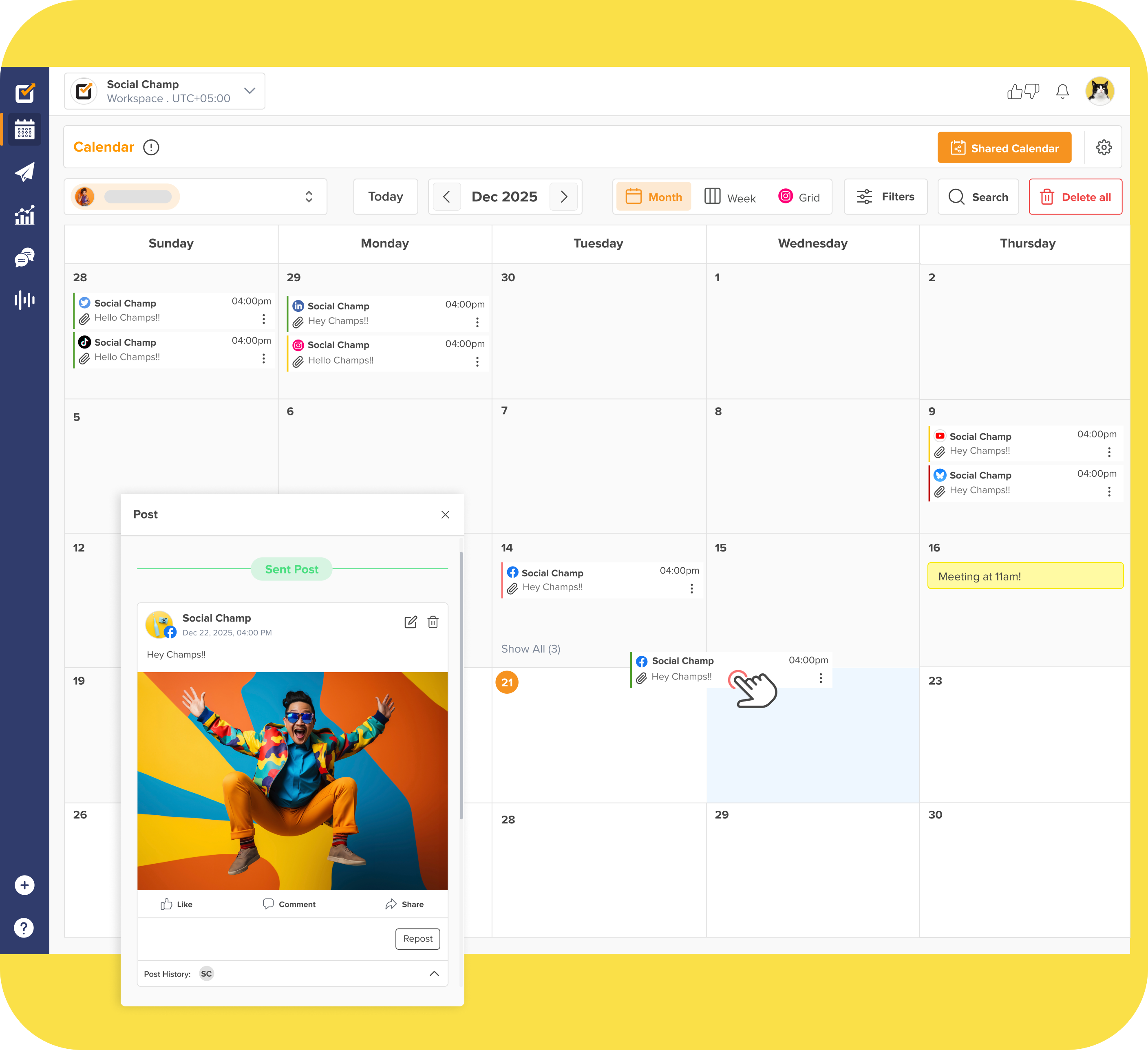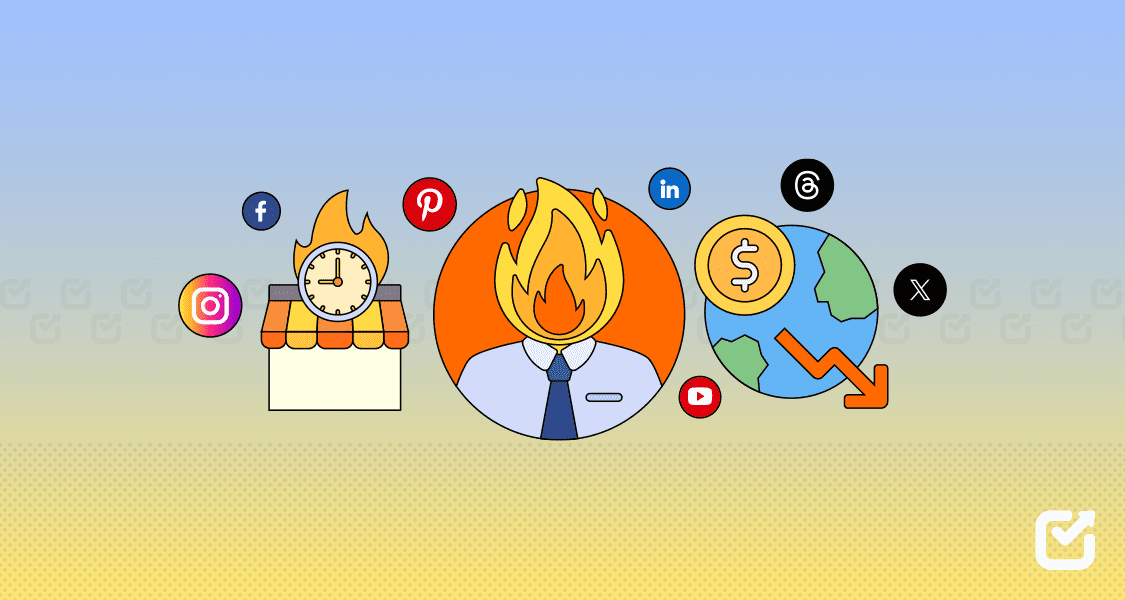You see the cool posts, funny captions, and viral moments, and think being a social media manager must be fun.
But behind the screen, it’s a very different story.
Social media manager burnout is becoming a serious issue, with many professionals feeling tired, stressed, and overworked.
You’ve no idea how they handle endless tasks every day, like posting, replying, checking numbers, and fixing last-minute problems.
Short Summary
- Social media manager burnout is rising due to long hours, constant online pressure, and a lack of support.
- Many managers feel undervalued, overworked, and unable to disconnect after work.
- Burnout affects creativity, productivity, and overall brand performance.
- Setting boundaries, using tools like Social Champ, and promoting team balance can help prevent burnout.
Still, many feel undervalued and underpaid for all the effort they put in.
It’s no wonder there’s a growing movement, #JusticeForSocialMediaManagers, where people are speaking up about the burnout and unrealistic expectations.
In this blog, we will look at why burnout has become such a big problem in the social media world and how both managers and leaders can work together to fix it.

Is Burnout Taking Over Your Passion?
Don’t let burnout win. Join a growing community of social media managers who are setting boundaries and finding better ways to work.
Join the Movement
What Does Burnout Actually Look Like for Social Media Managers?
Let’s talk about what burnout actually feels like to social media managers.

It’s not just about being tired, but a deep kind of exhaustion that comes from doing too much for too long without enough support or rest.
If you’re a social media manager, you’d better know that there are always comments to reply to, trends to follow, and results to check.
And over time, this can leave even the most passionate manager feeling empty and stressed.
What Is Burnout in Social Media Work?
Burnout happens when social media managers feel mentally and emotionally drained.
It often comes from long work hours, high expectations, and the pressure always to stay creative.

Since social media never sleeps, it can feel like you are always “on call.” Even small breaks feel impossible.
When burnout hits, managers start losing interest in their work. They stop feeling excited about new ideas or campaigns. Some may even feel numb or frustrated about simple tasks.
Common Symptoms of Social Media Burnout
Here are a few signs that a social media manager might be burning out:
- Constant tiredness or fatigue
- Feeling easily annoyed or upset
- Trouble thinking of new ideas or creating fresh content
- No motivation to post or plan campaigns
- Feeling undervalued or ignored by the team or clients
These symptoms may start small but grow over time if not handled early.
Day-to-Day Signs of Burnout
Burnout shows up in daily habits, too. You might:
- Stay up late replying to every comment or message
- Check work notifications during meals or family time
- Feel anxious about numbers like likes, reach, or engagement
- Struggle to switch off your mind even after work hours
- Compare your results to others and feel like you are not doing enough

These small moments can build up and lead to emotional exhaustion.
A Real-Life Example
Let me give you an example to make it easier for you to understand.
Take Tim, for example.
Tim is a social media manager who manages multiple brand accounts simultaneously.
She starts her day with scheduling posts and ends late with checking analytics.
Even on weekends, she scrolls through comments or fixes last-minute issues.
At first, she thought it was just part of the job. But soon, she felt tired all the time, lost interest in creating new content, and began to doubt her skills.
Tim’s story is very common. And even you can relate to it better, as many social media managers go through the same cycle without realizing they are burning out.
Burnout is not just feeling tired. It is a warning sign that something needs to change.
If you really want to create a healthier, more balanced work life, the first step you should take is to understand these signs completely.
Featured Article: Best Time to Post on Social Media: Key Data Insights Based on 5 Million Posts
Why Is Burnout So Common in the Social Media Industry?
Burnout is very common in the social media world because the job never really ends.
Social media is active 24/7, and managers feel they must always be online to keep up.
The mix of high pressure, fast deadlines, and constant feedback from audiences can quickly drain both energy and motivation.
-
Always Being Online
Social media managers often feel like they can never take a real break.
Notifications, messages, and comments keep coming in all day and night.
Even when they are off work, they still check their phones to make sure everything is running smoothly. This “always online” habit makes it hard to rest and recover.
-
Too Many Tasks, Not Enough Time
Usually, people think social media managers simply post updates, but they do a lot more than that.
They create content, reply to comments, plan campaigns, track analytics, and report results. Many also handle customer service and influencer outreach.
And it’s very easy to feel overwhelmed when you do all of this with short deadlines and limited support.
-
High Expectations and Little Recognition
Brands expect social media managers to be creative, fast, and perfect all the time.
They are often judged by numbers like engagement or reach, which can change overnight.
Even with all the effort they put in, many still feel undervalued and underpaid. This makes the job feel unfair and stressful.
-
The Emotional Side of Social Media
And when it comes to handling online communities, I think it’s the toughest part of a social media manager’s job.
They face negative comments, trolls, or public criticism almost on a daily basis.
Reading harsh feedback or dealing with angry followers can take a toll on mental health. Over time, it becomes harder to stay positive and motivated.
-
Lack of Boundaries
Many social media managers struggle to say no. They take on extra tasks or work beyond office hours to keep up with the fast pace of online platforms.
Without clear boundaries, personal time disappears, and burnout starts to grow.
Burnout is common in this field because the job demands constant attention and creativity without enough balance or support.
Why Social Media Burnout Isn’t Just an Individual Problem?
Basically, burnout doesn’t only affect a single person but the whole team, company, and even the social media industry.
When a social media manager burns out, it impacts productivity, creativity, and overall performance.

It also shows that there is a deeper problem in how the work is managed and supported.
Here is why burnout is not only an individual problem:
- Burnout often happens because of broken systems, not because people aren’t doing their best. Companies expect the world from their teams but don’t give them the time, tools, or support they need to succeed.
- When one manager feels burned out, the whole team struggles to keep up with deadlines and quality.
- And the truth is, burnout can hurt brand performance because creativity, tone, and consistency start to drop.
- When stress piles up and rest is in short supply, mistakes happen, communication breaks down, and responses slow to a crawl.
- And let’s not forget that replacing burned-out employees costs time and money, and new hires face the same problems if the system does not change.
- Leaders who ignore burnout risk losing skilled and creative people who once loved their jobs.
Social media burnout is a workplace problem, not just an individual one. Companies need to take it seriously and build a healthy environment where people feel supported, respected, and valued.
What the Stats Reveal About Social Media Burnout (and Why Leaders Can’t Ignore It)?
Burnout in social media jobs is not just a feeling. It is something that data clearly shows. These numbers prove why it is a serious issue that needs attention.
- A recent survey found that 51% of social media managers working in higher education say they are a “team of one”.
- In the same study, 79% said that their biggest struggle was working too much.
- A global workplace survey showed that 77% of workers have experienced burnout at their current job.
- Research on social media use found a clear link between feeling overloaded by platforms and a higher risk of burnout.
- Another study showed that in companies where social media managers lacked support and tools, mental health scores dropped sharply.
Why These Numbers Matter for Leaders
- High burnout rates mean a higher risk of employees quitting. When half the team feels stressed and unsupported, losing skilled people becomes likely.
- Productivity and creativity drop when people feel overworked and under pressure. This affects brand growth and audience engagement.
- Burnout points to system problems, not personal weakness. It shows that workload, support, and expectations are not balanced.
- Ignoring burnout can hurt the business. Missed deadlines, poor communication, and low morale cost time and money.
These numbers clearly show that burnout among social media managers is real and costly. It is not just one person having a bad day. It is a warning sign that teams and leaders must take seriously before it spreads further.
Featured Article: Best Time to Post on Facebook: Insights From Analyzing 3 Million Posts
How to Support Your Social Media Team Before It’s Too Late?
Burnout can be stopped if leaders take action early. Social media managers need balance, support, and the right tools to do their job well without losing motivation or health.
Small changes can make a big difference in how they feel and perform.

Here are simple ways to support your social media team before it’s too late:
- Set clear work hours
Make sure your team knows when to log off. Respect their off time and avoid asking for updates late at night or on weekends. This helps them rest and come back fresh. - Use the right tools
Invest in social media management tools that make work easier. Tools like Social Champ help schedule posts, track analytics, and manage multiple accounts from one place. This saves time and reduces daily stress. - Divide work fairly
Do not expect one person to handle everything. Spread tasks like content creation, replying to comments, and reporting across the team. This keeps workloads balanced and avoids pressure. - Encourage breaks and time off
Remind your team to take short breaks during the day and real vacations when needed. Even a few days away from screens can boost creativity and energy. - Offer emotional support
Check in regularly with your team. Ask how they are doing, not just how the numbers look. A simple chat can make them feel seen and valued. - Provide training and growth
Give your social media team a chance to learn new skills and grow in their roles. This helps them stay motivated and confident in their work. - Create healthy boundaries with clients and management
Make sure others understand that social media managers also need time to rest. Support them when they say no to unrealistic timelines or extra work.

Love Social Media? Make It Matter!
Join a friendly group of creators and social media managers who share ideas, support each other, and grow together.
Join the Ambassador Program
Conclusion
Taking care of your social media team and preventing social media manager burnout is more than just being nice.
It helps your company in many ways. When people feel supported, they work better, think more creatively, and stay longer in their jobs.
A happy and healthy social media team can handle challenges more easily and come up with fresh ideas that help the brand grow.
On the other hand, when managers feel overworked and unappreciated, their motivation drops, and so does the quality of their work.
By giving your team proper rest, tools, and respect, you build a strong and positive work culture.
Remember, when your team feels valued and cared for, your brand’s voice becomes stronger, more human, and more trusted by your audience.




